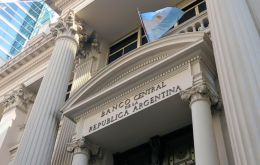MercoPress. South Atlantic News Agency
Economy
-
Friday, February 18th 2022 - 21:32 UTC
Eduardo Bolsonaro says Milei's role should be reassessed

Brazilian Deputy Eduardo Bolsonaro, son of President Jair Bolsonaro, Thursday praised his Argentine colleague Javier Milei, whom he found way different from former President Mauricio Macri, it was reported.
-
Friday, February 18th 2022 - 20:29 UTC
Uruguayan President promised new investments by Argentine group

Uruguayan President Luis Lacalle Pou met this week with representatives from the Argentine Grupo Werthein to discuss further developments and investments in the country, it was reported.
-
Friday, February 18th 2022 - 10:25 UTC
Argentina’s Central Bank raises interest rates amid growing inflation

Argentina’s Central Bank (BCRA) Thursday increased interest rates to 42.5%, it was announced. The measure is consistent with recent talks between the Government of President Alberto Fernández and the International Monetary Fund (IMF).
-
Friday, February 18th 2022 - 09:24 UTC
Falklands' Chamber of Commerce organizes First Environmental Business Symposium

The Falkland Islands Chamber of Commerce has announced the first Falkland Islands Environmental Business Symposium, will be held at 12:30 on the 18th of March. The Chamber is bringing together speakers from organizations across the Falklands to share knowledge and discuss what businesses can do to reduce or offset their environmental impacts.
-
Thursday, February 17th 2022 - 10:50 UTC
Bolsonaro, Putin discuss strengthening bilateral trade and cooperation

Brazil's President Jair Bolsonaro and his Russian colleague Vladimir Putin Wednesday underlined the future importance of the BRICS partnership (Brazil, Russia, India, China and South Africa) and called for a more fluent dialogue between the Mercosur and the Eurasian Economic union (EAEU), according to a joint statement released after their meeting in Moscow.
-
Thursday, February 17th 2022 - 10:12 UTC
Patagonia January inflation 3,6%, double the Falklands' annual retail prices index

Despite highly subsidized public rates, a long list of coerced consumer prices, relatively cheap fuel in the current global energy-short environment, the Consumer Price Index in Argentine Patagonia, mainly Tierra del Fuego, reached 3,6% in January, according to the latest report from the official stats office, Indec.
-
Thursday, February 17th 2022 - 09:30 UTC
Peruvian exports above pre-pandemic figures, report shows

Exports of Peruvian manufacturers during the year 2021 have surpassed pre COVID-19 pandemic levels, it was reported Wednesday by the Institute of Economic and Social Studies (IEES) of the National Society of Industries (SNI).
-
Wednesday, February 16th 2022 - 09:55 UTC
Foreign Ministers of Argentina, Uruguay highlight bilateral increasing trade

Argentina's Foreign Minister Santiago Cafiero Tuesday in Buenos Aires with his Uruguayan counterpart Francisco Bustillo to discuss a 33% increase in bilateral trade, among other issues.
-
Wednesday, February 16th 2022 - 09:46 UTC
Argentina's inflation reaches 3.9% in January

Despite requirements from the International Monetary Fund (IMF) that inflation needs to be under control, Argentina's National Institute of Statistics and Censuses (Indec) Tuesday reported January's figures had reached 3.9% for a 50.7% YoY.
-
Wednesday, February 16th 2022 - 09:22 UTC
Inflation remains strong in Chile; Central bank expected to take reference rate to 8% next May

A survey of financial operators in Chile anticipates that the aggressive policy of the country's central bank to combat rising prices will continue to hike interest rates, anticipating the basic rate from the bank's Monetary Policy office will be reaching 8% by next May.
